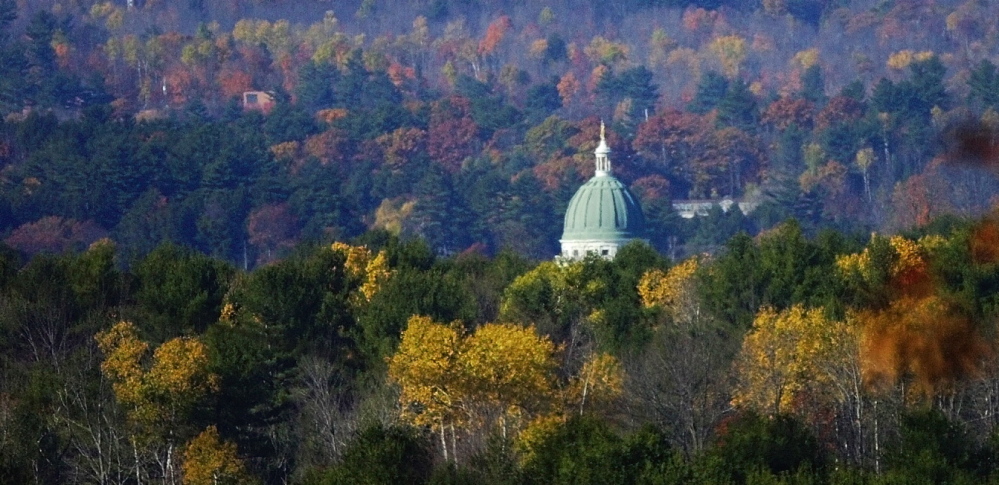AUGUSTA — The Augusta Conservation Commission wants to know how the 164-acre Howard Hill property should be used, other than as a flashpoint in political battles.
The Kennebec Land Trust bought the property last October and plans, once a loan for it is paid off, to give it to the city of Augusta, probably this year.
The land will come to the city with a conservation easement attached by the land trust, preventing it from being resold, subdivided or developed commercially, and limiting its uses to recreational or conservation-related purposes. Beyond those restrictions, it is up to the city to decide how to use the undeveloped property, which provides a scenic, largely unspoiled wooded backdrop to the State House.
The commission, a city board, is seeking input from residents and other interested parties about how the property should be used, at the first of what is expected to be a series of meetings. The initial meeting is scheduled for 6:30 p.m. Tuesday in the lecture hall on the lower floor of Augusta City Center.
“Buildings, subdivisions, those kinds of things, anything that is not in keeping with protecting and conserving that natural resource, are not going to happen,” said Leif Dahlin, the city’s community services director. “We’re looking at passive, natural-resource-based recreational pursuits. Hiking, cross-country skiing, snowshoeing, potentially getting out to the vistas there that look out over the Capitol. This is the kickoff of the public process to engage the community to ensure we listen to the residents and other interested individuals, as to what they want to see happen with Howard Hill.”
A PROMINENT FIGHT
For nearly the last two years, since the proposal to acquire the land was presented to the city, Howard Hill has been more prominent as a focus of a political fight over the state’s Land For Maine’s Future program. Eventually, the program is expected to be a significant source of funds for the Kennebec Land Trust as it pays for the property.
The land trust paid $925,000 to buy the property from attorney Sumner Lipman and two corporations run by him. The trust had planned to use $337,500 from the Land for Maine’s Future program, which was established in 1987 and has since helped conserve more than 500,000 acres of land in Maine, through land sales or conservation easements. The program is funded primarily by bonds approved by voters.
The $337,500 the Land for Maine’s Future program had awarded to help the Kennebec Land Trust buy Howard Hill was delayed by Gov. Paul LePage’s refusal last year to issue $6.5 million in bonds approved by voters in 2010 and $5 million approved in 2012.
Since then, LePage has said he would issue the $5 million in Land for Maine’s Future bonds that had not expired and issue the $6.5 million in bonds if the Legislature renewed them. The House of Representatives and the Senate voted to renew the $6.5 million in bonds, but the proposal still awaits final approval.
Theresa Kerchner, executive director of the Kennebec Land Trust, said the organization still intends to use the $337,500 it hopes to get in Land for Maine’s Future money to help pay off a loan of $500,000 it took out to complete the Howard Hill purchase. The trust can’t give the land to the city until the loan is paid off.
“We assume the Land for Maine’s Future process will be moving forward once the bonds are issued,” Kerchner said. “I’ve heard that will be the first of July.”
Kerchner said she’s looking forward to Tuesday’s session in Augusta and working with the city on the future stewardship of the Howard Hill property, which comprises a large undeveloped tract surrounded by Augusta’s south end and Ganneston Park neighborhoods and the city of Hallowell.
While the property will come with restrictions on its use, that doesn’t mean changes won’t take place. Structures could even be built, but only if they have a conservation or outdoor recreation purpose.
Such a structure eventually could include some form of viewing platform where people who hike in can look out over the Capitol dome, the Kennebec River and beyond.
Uses that probably could happen more quickly include hiking and bicycling trails, with some informal trails already on the site.
Hunting possibly could be allowed on the site, but it would be only bow hunting because the property is within the city’s urban compact area, where hunting with guns is not allowed, Dahlin said.
Send questions/comments to the editors.




Success. Please wait for the page to reload. If the page does not reload within 5 seconds, please refresh the page.
Enter your email and password to access comments.
Hi, to comment on stories you must . This profile is in addition to your subscription and website login.
Already have a commenting profile? .
Invalid username/password.
Please check your email to confirm and complete your registration.
Only subscribers are eligible to post comments. Please subscribe or login first for digital access. Here’s why.
Use the form below to reset your password. When you've submitted your account email, we will send an email with a reset code.